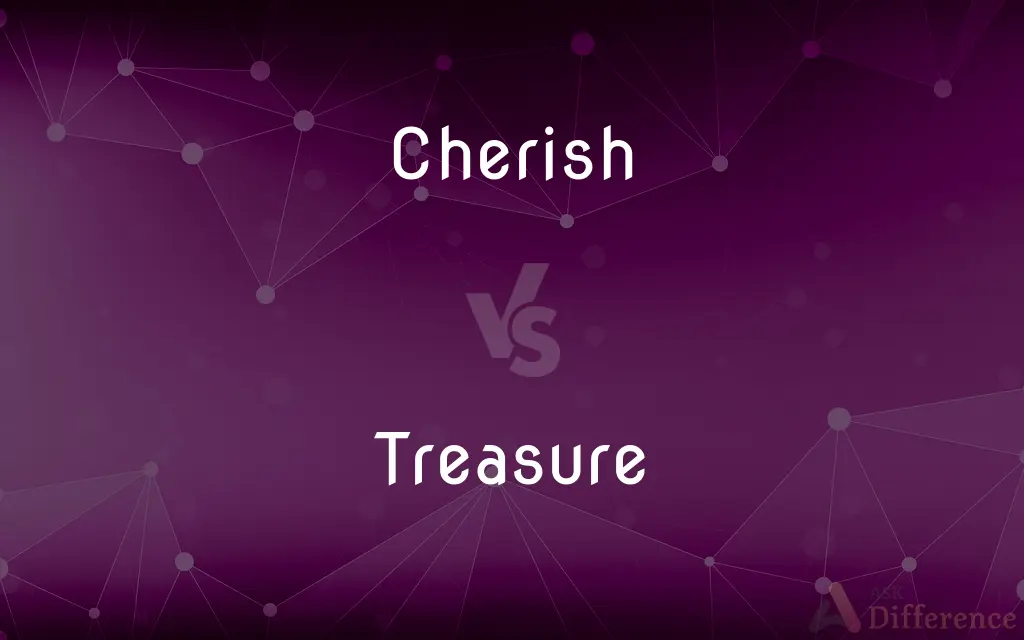Cherish vs. Treasure — What's the Difference?
By Maham Liaqat & Urooj Arif — Updated on March 21, 2024
Cherish implies a deep, tender, ineffable feeling of affection, while treasure signifies highly valuing or regarding something as precious.

Difference Between Cherish and Treasure
Table of Contents
ADVERTISEMENT
Key Differences
Cherishing something often involves a deep, emotional attachment and care, focusing on the sentimental or emotional value of an object, memory, or person. This attachment is nurtured over time and is associated with love and affection. On the other hand, to treasure something usually implies holding it in high regard due to its perceived rarity, value, or importance. This can apply to both tangible items, like jewelry or heirlooms, and intangible aspects, such as friendships or experiences.
For example, one might cherish memories with loved ones or cherish a gift from someone special, highlighting the emotional significance rather than material value. Treasuring often involves a sense of preservation and protection, ensuring that the valued item or memory is maintained and kept safe from harm or loss.
Cherishing can be seen as a more active, ongoing process that involves nurturing and sustaining emotional connections or memories. It is about continuously valuing and holding dear, often in a more intimate, personal context. Whereas treasuring might be considered more passive, focusing on the acknowledgment of something's worth and the intent to keep it protected. It doesn't necessarily entail an ongoing emotional engagement but rather a recognition of significance and a desire to preserve that value.
The act of cherishing is often associated with softer, more gentle emotions and actions, reflecting a kind of warmth and tenderness towards the cherished object or person. While treasuring, though it can also be deeply emotional, carries a connotation of esteem and high regard, often linked to the idea of safeguarding something considered invaluable or irreplaceable.
Comparison Chart
Definition
To hold dear and nurture with affection
To regard or keep as precious
ADVERTISEMENT
Focus
Emotional attachment and care
Value and importance
Nature
Active nurturing of emotional connections
Recognition and preservation of worth
Emotion
Tender, loving affection
High regard and esteem
Application
Often used in personal, intimate contexts
Can be applied to both tangible and intangible assets
Compare with Definitions
Cherish
To hold something dear in an emotional and affectionate manner.
She cherishes the time spent with her grandparents during the summers of her childhood.
Treasure
To regard or treat something with great respect due to its perceived importance.
They treasure the moments of peace in their hectic lives, making the most of quiet mornings.
Cherish
To protect and honor the sentimental value of an object, memory, or relationship.
They cherish the family heirloom, passing it down through generations with great care.
Treasure
To hold in high regard, considering something as precious or valuable.
She treasures the necklace her mother gave her, wearing it only on special occasions.
Cherish
To nurture or sustain a deep affection or love for someone or something.
He cherishes his friendship with his childhood friend, constantly keeping in touch despite the distance.
Treasure
To value something for its rarity, uniqueness, or the special place it holds.
He treasures the handmade gifts from his children, displaying them proudly in his office.
Cherish
To continuously care for and hold in high emotional regard.
She cherishes the letters her father wrote to her, reading them often.
Treasure
To keep something safe because its value is recognized and esteemed.
He treasures the first edition book he found at an antique store, keeping it in a glass case.
Cherish
To form a sentimental and loving attachment that is nurtured over time.
He cherishes the tradition of family dinners, ensuring they continue even as the children grow up.
Treasure
To be protective over something considered invaluable or irreplaceable.
She treasures her privacy, carefully choosing what to share on social media.
Cherish
To treat with affection and tenderness; hold dear
Cherish one's family.
Fine rugs that are cherished by their owners.
Treasure
Treasure (from Latin: thesaurus from Greek language θησαυρός thēsauros, "treasure store") is a concentration of wealth — often originating from ancient history — that is considered lost and/or forgotten until rediscovered. Some jurisdictions legally define what constitutes treasure, such as in the British Treasure Act 1996.
Cherish
To keep fondly in mind; treasure
Cherish a memory.
Treasure
Accumulated or stored wealth in the form of money, jewels, or other valuables
Search for buried treasure.
Spending much of the national treasure on armaments.
Cherish
To treat with affection, care, and tenderness; to nurture or protect with care.
Treasure
Valuable or precious possessions of any kind.
Cherish
To have a deep appreciation of; to hold dear.
I cherish your friendship.
Treasure
One considered especially precious or valuable
Bought several treasures at the estate sale.
Saw her assistant as a treasure.
Cherish
(obsolete) To cheer, to gladden.
Treasure
To keep or regard as precious; value highly.
Cherish
To treat with tenderness and affection; to nurture with care; to protect and aid.
We were gentle among you, even as a nurse cherisheth her children.
Treasure
To accumulate or store away, as for future use
"This same withered and crumbling flower ... Five and fifty years it has been treasured between the leaves of this old volume" (Nathaniel Hawthorne).
Cherish
To hold dear; to embrace with interest; to indulge; to encourage; to foster; to promote; as, to cherish religious principle.
To cherish virtue and humanity.
Treasure
(uncountable) A collection of valuable things; accumulated wealth; a stock of money, jewels, etc.
Cherish
Be fond of; be attached to
Treasure
(countable) Anything greatly valued.
Treasure
(countable) A term of endearment.
Treasure
To consider to be precious; to value highly.
Oh, this ring is beautiful! I’ll treasure it forever.
Treasure
(transitive) To store or stow in a safe place.
Treasure
To enrich.
Treasure
Wealth accumulated; especially, a stock, or store of money in reserve.
This treasure hath fortune unto us given.
Treasure
A great quantity of anything collected for future use; abundance; plenty.
We have treasures in the field, of wheat and of barley, and of oil and of honey.
Treasure
That which is very much valued.
Ye shall be peculiar treasure unto me.
From thy wardrobe bring thy chiefest treasure.
Treasure
To collect and deposit, as money or other valuable things, for future use; to lay up; to hoard; usually with up; as, to treasure up gold.
Treasure
Accumulated wealth in the form of money or jewels etc.;
The pirates hid their treasure on a small island in the West Indies
Treasure
Art highly prized for its beauty or perfection
Treasure
Any possession that is highly valued by its owner;
The children returned from the seashore with their shells and other treasures
Treasure
A collection of precious things;
The trunk held all her meager treasures
Treasure
Hold dear;
I prize these old photographs
Treasure
Be fond of; be attached to
Common Curiosities
Can objects be cherished or only people?
Both objects and people can be cherished, especially when they hold significant sentimental value or are associated with cherished memories.
Can you cherish and treasure something at the same time?
Yes, you can both cherish and treasure something, valuing it emotionally and recognizing its importance or worth.
Is cherishing more emotional than treasuring?
Cherishing is often associated with deeper emotional attachment and nurturing care, whereas treasuring emphasizes the recognition of value and importance.
What does it mean to cherish someone?
Cherishing someone means to hold them dear and nurture a deep, affectionate emotional connection with them.
How do actions reflect cherishing or treasuring something?
Actions that reflect cherishing include nurturing, caring, and emotionally engaging with something, while treasuring actions might involve preserving, protecting, and holding in high regard.
Can treasuring something lead to cherishing it?
Yes, initially treasuring something for its value can lead to developing a deeper emotional connection, thus cherishing it over time.
What kinds of things are typically treasured?
Items of personal significance, rare collectibles, precious heirlooms, and invaluable memories are typically treasured.
Do cultural differences affect what people cherish or treasure?
Cultural backgrounds can influence what individuals cherish or treasure, reflecting differing values and traditions.
Is cherishing a passive or active process?
Cherishing is an active process involving continuous emotional engagement and nurturing.
Is it possible to stop cherishing or treasuring something?
Changes in personal values, experiences, or circumstances can lead to a shift in what one cherishes or treasures.
Share Your Discovery

Previous Comparison
Ectotherm vs. Poikilotherm
Next Comparison
Cone vs. ConalAuthor Spotlight
Written by
Maham LiaqatCo-written by
Urooj ArifUrooj is a skilled content writer at Ask Difference, known for her exceptional ability to simplify complex topics into engaging and informative content. With a passion for research and a flair for clear, concise writing, she consistently delivers articles that resonate with our diverse audience.














































